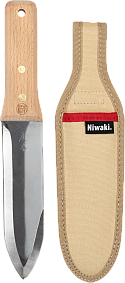
Niwaki Hori Hori Pro
$42.50 exVAT
Delivering to US (Paying in USD)
Please note: By law, we are not permitted to sell a knife or blade to any person under the age of 18. By placing an order for one of these items you are declaring that you are 18 years of age or over. These items must be used responsibly and appropriately.
For those days when ones Nata Hatchet is too clumsy and ones Sickle too flimsy - where else to turn but the Billhook Sickle? Perfect for tough brambles, light brashing and other woodsy jobs. 6" forged steel blade with white oak handle.
Sharpen with a Niwaki#1000 for the best finish.
Most of our sharp tools are made from carbon steel - this means they may, through regular use, stain (and eventually rust) and gradually lose their edge. Caring for them involves three things…
New tools won’t need sharpening for some time, but after a while you’ll notice them gradually lose their edge, especially if you’re box clipping (you need REALLY sharp blades to get a good finish with box). Use the Niwaki Sharpening Stones for best results (#1000 grit is best for general sharpening).